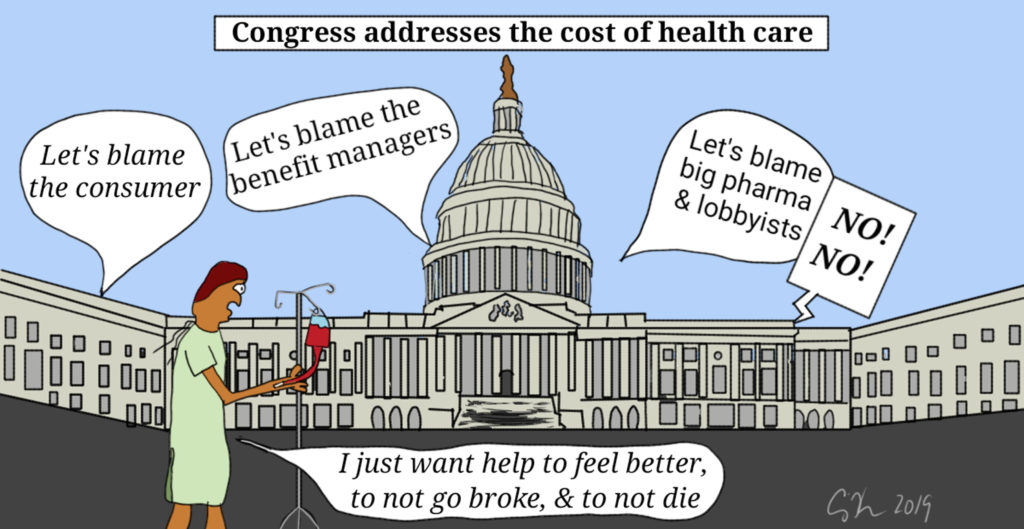by Craig Klugman, Ph.D.
One of the first lessons of professionalism that I was taught, and that I teach my students, is that health care values transparency and honesty. I, and many others, teach that health care providers should admit when they make mistakes and say “I’m sorry” (I know that many of the lawyers out there may disagree). The idea of transparency is also purportedly behind a new Department of Health and Human Services rule that drug ads on television must include the price of the drug (though there are lots of loopholes and prices do vary by region and insurance plan). Johnson & Johnson is the first company to roll out drug prices in ads. Another new law requires that hospitals publish a list of their prices. Another proposal would have hospitals also make public the prices they charge health insurers (which is usually less than full retail).
If transparency is central to the practice of medicine and health care, then why is transparency so absent from most of the industry? Consider the rise of hospital acquired, multi-drug resistant infections. The CDC knows which hospitals have been effected, but the federal agency is prevented from revealing the names of those hospitals. In situations where there is a problem, transparency is not to be found. Instead, institutions button up, hoping to maintain their reputation and protect themselves from liability. Some parts of the healthcare system are permitted to keep their financials secret—Medicare Advantage plans do not have to share their financials or even how they spend their money and how much profit they make. Another report alleges that Republicans are telling drug companies not to cooperate with a House investigation of drug prices.

This week, the Senate is holding hearings on pharmaceutical benefit managers—middlemen who help employers choose drug plans for their workers: “There’s a lot of secrecy. There’s not a whole lot of understanding of the role they play,” Senator Chuck Grassley (IA) said in a “Squawk Box” interview. “Our goal is to end this secrecy, get to transparency. With transparency comes accountability.”
How did a value like transparency become something so highly valued in patient care but so eschewed in health care business? The answer is about political power—individual patients have little of it while the health care industry spends $560,000,000 annually on its team of 2,800 political lobbyists. The idea of transparency also plays well into the American myth about who is responsible for the high costs of drugs and medical care. Surprise, we’re supposed to believe it’s the individual patient. The idea behind transparency for hospital and drug pricing is the myth that if consumers (what were formerly known as patients) knew the costs, then they would choose less expensive options. The myth is that with transparency, we are in control of our health care. However, the myth is not true.
At first we were told that the problem was greedy doctors charging too much. Then we heard it was the fault of hospital mergers reducing choice. Then the story became about the high cost of drugs and medical devices. Today, it’s the benefit managers that are the bogeymen. Notice who never gets blamed? The executives who decide pricing and who take home bonuses. The elected officials who maintain the current system that benefits the wealthy. And we never, ever blame the system itself, a system that makes access to medicine, doctors, and hospitals dependent on having a good job, being rich, or living in a goodzip code. It’s much easier to blame a middle manager or a patient than it is to actually see the health care system is set up to do exactly what it does—extract dollars from the middle and lower classes to funnel wealth to those who are already wealthy.
Real change demands real transparency. If transparency is a value, then it must apply at all levels. To that end, I propose that hospitals, device manufacturers, and pharmaceutical companies make public their profits and their profit margin. How about revealing the salaries and bonuses each year of executives, how much each elected official receives from the industry, and what the mark up is for drugs and devices. Let’s create a real public health insurance option and make it illegal to make profit off of suffering. Rather than focusing on access to health insurance, as the Affordable Care Act did, let’s focus on access to actual medical care. Let’s protect people from facing bankruptcy as a result of seeking care, separate insurance from employment, and allow Medicare and the VA to negotiate prices with manufacturers (something that they are prohibited by law from doing now).
Let’s say out loud what has been true for a long time, the high cost of health care is not because of patient’s choices. In most cases patients have few choices, only able to go to the hospital or doctors that take their insurance, or that take people with no insurance. The solution to health care pricing is not to ask people to make more cost-conscious choices. A sick person is not going comparison shopping: My appendix just ruptured, let me watch some TV commercials and look at some websites to see what the various prices are at area hospitals.A sick person is not a rational economic consumer. What is sick is our system and the cure is to make it work for patients, not solely for corporations.